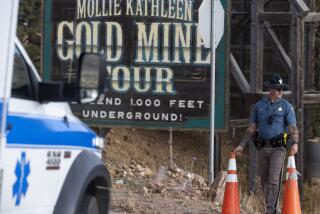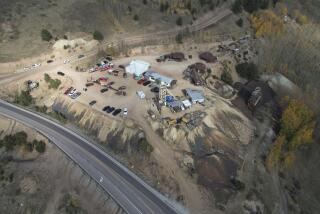31 Die in West German Coal Mine Blast
- Share via
BORKEN, West Germany — An explosion about 300 feet underground in a coal shaft Wednesday killed 31 miners and trapped 26 others, who were given little chance of survival.
About 30 rescue workers used large drills early today to bore through tons of debris in an urgent effort to reach the trapped miners.
The explosion scorched the ground on the surface, where eight men were critically injured. The blast also blew the roofs off at least three work buildings at the mine, knocked down sheds and shattered windows.
More Bodies Found
Early today, Hessiche Rundfunk radio quoted authorities as saying 31 bodies had been found, raising by 15 the number of dead that had been earlier confirmed.
Twenty-six miners were still trapped 330 feet below ground, the Frankfurt-based radio station said.
Gottfried Milde, Hesse state interior minister, said 57 miners were in the shaft when the blast occurred at midday at the mine near Borken, 70 miles northeast of Frankfurt.
He said there was little hope of finding any others alive. About one-third of the men were foreigners, including 14 Turks, he said.
Families at Scene
Family members and friends of the missing men went to the mine and clung to each other for support as they waited.
“It’s horrible. My husband is down there,” said Ingrid Henke, 35. “My daughters are just 1 and 2.”
A woman who would not give her name, but said that her husband was not in the shaft, added: “All the women in this part of town are doing their best to comfort each other.”
Around them was the mangled wreckage of the steel beams, sheds and fences blown away by the explosion.
Erwin Braun, head of the Hesse state mining board, said all indications pointed to a gas explosion caused by a buildup of coal dust. Radio reports said the accident may have been caused by the detonation of 4,400 pounds of explosives stored in the mine.
The lignite coal mine belongs to Preussen Elektra of Hanover, one of the largest West German utility companies.
Milde, the state interior minister, said rescue workers were leaving the bodies where they found them in the shaft and moving on to search for others.
Wives and children watched from nearby as workers rushed to reach the miners and pump oxygen into the shaft.
Many family members were crying. Some had brought small baskets filled with food, a sign they planned for a long night of waiting.
Dense smoke engulfed the area after the blast at about 12:30 p.m., half an hour before the change of shifts. Hundreds of rescue workers rushed to the mine and several helicopters were brought in.
Gerhard Heinz, an engineer, said the explosion occurred at a depth of between 200 and 460 feet.
It critically injured eight miners on the surface and scorched the ground.
Otto Kraft, a miner still blackened from the explosion, said: “I’ve never seen anything like it.”
Klaus Hausmann, a mine mechanic, said: “I have no real hopes. I think we’ll have to bury a lot of people.”
More to Read
Sign up for Essential California
The most important California stories and recommendations in your inbox every morning.
You may occasionally receive promotional content from the Los Angeles Times.













